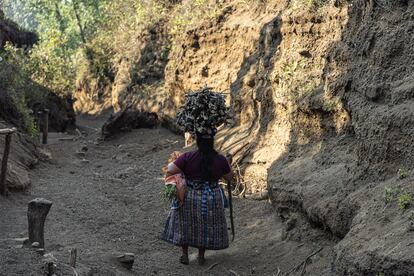Women and girls suffer more from the impact of dirty energy, according to the OECD
A new report warns that gender-based traditional hierarchies within the household negatively influence women’s capacity to cope with disasters induced by climate change

Much of the world is talking about “energy transition,” an expression which refers to the period in which the global economy is expected to shift from relying on fossil fuels to renewable sources. However, according to a new report from the Organization for Economic Co-operation and Development (OECD), women and girls are being left out of this conversation even though they are more directly impacted by climate change.
“We found out that 60% of the long term low emission development strategies are gender blind and we wanted to know why,” says Hyeshin Park, economist and coordinator of the Gender Program at the OECD Development Center, in a video call with EL PAÍS from Paris. Park and her colleagues presented a report called Gender Equality in Times of Crisis, drawn from the Social Institutions and Gender Index (SIGI). The findings unearth the difficult reality faced by women and girls in developing countries, such as those in Latin America, where 17 million homes have no power.
“It’s mainly because these strategies don’t really take into account the fact that women and girls are disproportionately affected by climate change-induced the disasters and unclean sources of energy,” Park says. When a home does not have access to electricity, it is women and girls who must go out to look for firewood, coal or even natural gas that will be used in the home for cooking and heating. This exposes them more to polluting emissions and even to accidents that lead to death. “Traditional gender roles still limit women to domestic roles and household responsibilities,” Park adds.
Globally, six out of 10 premature deaths are due to indoor air pollution, according to the OECD. Women and children are also 14 times more likely to die in a natural disaster resulting from climate change than men, since traditionally men are the most in-contact with the outside world — especially in developing countries. “[Women and children] have no access to information when there is a alarm warning of a disaster happening.” explains Park. “If only the husbands have phones, for example, the women and children are the last to know the information. And, in some countries, women cannot even go outside the home without a man’s approval.”
According to the report, women are doubly impacted by polluting energy sources. On the one hand, the 200-page report explains that due to traditional gender roles, women are the main users and suppliers of energy within the home. “This disproportionate exposure to dirty energy sources has profound implications for their unpaid care and domestic workload, as well as their health. Furthermore, climate change tends to increase these adverse effects.”
On the other hand, “they face a number of barriers that prevent them from being involved in the sector and from fully participating in decisions related to the development and deployment of innovative projects,” the report notes. “Women remain largely disempowered in the renewable energy sector, which constitutes one of the main pathways to reduce global emissions and mitigate the effects of climate change.,” concludes the OECD.
Sign up for our weekly newsletter to get more English-language news coverage from EL PAÍS USA Edition
Tu suscripción se está usando en otro dispositivo
¿Quieres añadir otro usuario a tu suscripción?
Si continúas leyendo en este dispositivo, no se podrá leer en el otro.
FlechaTu suscripción se está usando en otro dispositivo y solo puedes acceder a EL PAÍS desde un dispositivo a la vez.
Si quieres compartir tu cuenta, cambia tu suscripción a la modalidad Premium, así podrás añadir otro usuario. Cada uno accederá con su propia cuenta de email, lo que os permitirá personalizar vuestra experiencia en EL PAÍS.
¿Tienes una suscripción de empresa? Accede aquí para contratar más cuentas.
En el caso de no saber quién está usando tu cuenta, te recomendamos cambiar tu contraseña aquí.
Si decides continuar compartiendo tu cuenta, este mensaje se mostrará en tu dispositivo y en el de la otra persona que está usando tu cuenta de forma indefinida, afectando a tu experiencia de lectura. Puedes consultar aquí los términos y condiciones de la suscripción digital.









































